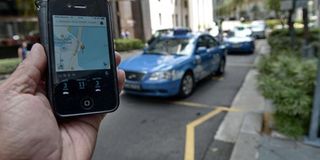Will taxis give way to share-a-ride app?

A smartphone displaying the Uber app, which indicates the timing and availability of accredited cars within an area. Protests against the app have been held in London, Berlin, New York and Seattle. PHOTO | FILE |
What you need to know:
- Service could drive regular taxis out of business, besides posing security risks to users
- Easy Taxi, another app that works in a similar way, connects passengers to taxis — although it works with registered taxis only.
As share-a-ride company Uber was launching its services in Nairobi this week, union taxi activists in the United States and Europe were convening in New York.
Their main concern: Uber, the smartphone app that has turned into a global transportation phenomenon, was putting traditional taxi drivers out of work by opening up the business to thousands of drivers who don’t have to operate within existing rules.
This is the same dilemma facing taxi operators in Nairobi as the application rolls out in its sixth African city. The Uber app already works in 260 cities across the world.
The free-to-download app allows car owners to apply and become Uber-accredited drivers to make extra money. When accessed by someone who wants to hail a taxi, the app shows all Uber accredited cars in the vicinity. All a customer has to do is tap on the one he wants to use.
The company says its technology will shake up taxi business in the capital that is facing a limited supply of vehicles and a considerable tech-savvy population.
“Citizens of Nairobi are progressive and tech-savvy, and in particular, love products that are cool and offer a new experience. Uber is doing just that,” Mr Alastair Curtis, Uber’s International Launcher for Africa, told Sunday Nation.
“Our goal is to match demand with supply, which is already steadily growing, through reducing the estimated time of arrival to as little as possible and ensure cars are available when people want them, wherever and whenever,” he said.
By allowing car owners to work part time as PSVs, taxi drivers in Nairobi are likely to find it harder to get business, just as has happened in several cities where the app is working.
Last June, taxi operators in London staged week-long protests against the app they claimed was not being subjected to proper regulations. Similar protests have been held in Berlin, New York and Seattle.
The Kenya Taxi Cab Association has also raised similar issues. “All taxi operators are required to apply to the county government to get a permit and are to operate within certain regulations which dictate the areas they are supposed to operate from,” said the association’s chair Peter Mburu.
“This is a business and a livelihood to many people which needs to be controlled. You cannot just change a vehicle from personal use to commercial use and vice versa the way you want. It’s illegal and compromises your safety and that of the passengers,” he said.
In India, the app was banned last month before being reinstated this week after a woman who entered one such taxi was raped by the driver, raising questions about passenger safety amid claims that Uber taxi drivers are not thoroughly vetted by the firm.
The company maintains the incident was isolated. It says it is aware of the insecurity situation in Kenya and is taking necessary steps to ensure the safety of passengers and drivers.
“All partner-drivers in Nairobi have a commercial licence and insurance. Uber takes it one step further but ensuring that all partner-drivers undergo a comprehensive biometric criminal background check before they are allowed to drive on the Uber system,” Mr Curtis said.
“In addition, Uber performs regular vehicle inspections to make sure vehicle safety standards are maintained,” he said.
But the company will not be alone in this field, as it is joining an industry that has been testing the use of smartphone apps to enhance service delivery, with noted successes and failures.
Easy Taxi, another app that works in a similar way, connects passengers to taxis — although it works with registered taxis only. Wapigo, Taxipixi, Pewn Cabs and Sasa Cabs are also operational and work in a manner similar to Easy Taxi, although none has dominated the market yet.
South African startup company Zapa Cab launched itself in Nairobi in 2013 but operated for less than a month, while My Taxi — which won an AppWiz competition organised by Safaricom in 2013 — is yet to launch its operations as the race to digitise the taxi industry gathers momentum.





